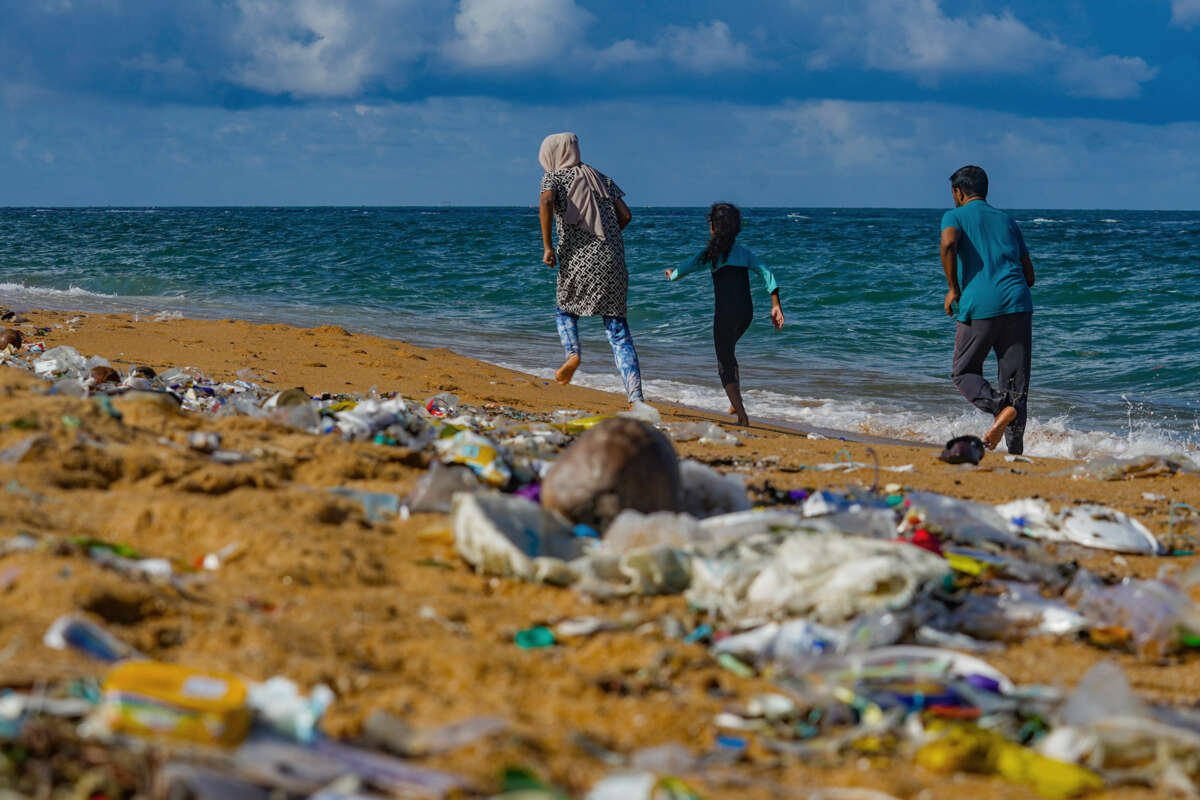In March 2022, 175 countries agreed to write a global treaty to address the plastic pollution crisis. Now, a year and a half later, they finally have a rough draft.
The chair of the Intergovernmental Negotiating Committee on Plastic Pollution on Monday released a “zero draft” of the global plastics treaty, laying out a long list of proposals and sub-proposals for how the world can stem the tide of plastic pollution. It includes language on reducing plastic production and eliminating hazardous chemicals, steps that experts say are needed to mitigate the industry’s harms. But advocates say negotiators need to do more work to establish how much reduction is needed, and to prevent an outsize focus on recycling.
“This draft is only the starting point,” Eirik Lindebjerg, plastic policy lead for the nonprofit WWF Global, said in a statement. “We need countries to dial up ambition and finalize a plastics treaty that is globally binding, with bans on high-risk, single-use products.”
Perhaps the most significant part of the draft is its focus on plastic reduction, which environmental groups say is necessary in the face of plastic companies’ plans to triple plastic production by 2060. Those plans would lead to 44 million metric tons of plastic pollution being generated every year, up from about 22 million metric tons in 2019.
The document lays out a number of options for scaling back the use and manufacturing of plastic, whether by having countries set their own mandatory reduction targets or asking them to adhere to a global target established in the treaty. To meet those yet-to-be-determined targets, countries could ban particular types of plastic, remove subsidies for plastic production, or implement market-based measures like a plastic tax.
The draft also proposes that countries phase out microplastics — fragments of plastic that are under 5 millimeters in diameter — that are intentionally added to products, like the microbeads added to some types of body wash. It also suggests winding down the use of “problematic and avoidable plastic products,” such as single-use cutlery. One article proposes additional targets for “reuse, repair, repurposing, and refurbishment” of plastic products, something advocates have called a “potential game changer.”
Additional sections propose tighter controls on some of the 13,000 chemicals used in plastic production, whether by requiring more transparency from plastic companies about the ingredients they use or restricting the export of plastics containing hazardous chemicals.
The options represented in the draft are meant to reflect a broad spectrum of opinions based on input from the parties to the treaty. Delegates will discuss them in greater detail this November, when they’ll gather in Nairobi, Kenya, for their third major round of negotiations.
Some of the details to be ironed out include whether reduction targets and timelines should be set at the national or global level, and whether countries should be required or just “encouraged” to implement specific parts of the treaty.
In general, plastic companies have lobbied for a voluntary, bottom-up approach in which countries are free to set their own agendas on their own timelines. Instead of reducing plastic production — which they argue would “hinder progress toward a more sustainable, lower carbon future,” since plastic is used in renewable energy infrastructure — they’d prefer a treaty focused on recycling, cleanup, and other waste management efforts. The draft document nods to this approach with references to “increased recyclability” of plastics and “environmentally sound” disposal, which it doesn’t define further. Globally, only 9 percent of plastic waste is ever recycled due to technical and economic barriers — it’s usually cheaper just to make virgin plastic — and experts say the recycling rate is unlikely to significantly improve.
The American Chemistry Council, or ACC, a trade group whose members include major fossil fuel and petrochemical companies, told Climate Home News last May that “restricting the production of plastic materials essential to delivering clean water, renewable energy, and sanitary medical and personal care products is the wrong approach.”
Environmental groups have called the draft an “important milestone” toward an ambitious global plastic treaty, although they remain wary of language on recycling and waste management, which they say could be used to avoid reducing plastic production.
Many are now urging countries to rally around a more concrete reduction target based on plastic production’s contribution to climate change. According to a recent report from the nonprofit Pacific Environment, the industry’s global carbon footprint was 1.3 billion metric tons in 2020 — twice as big as Canada’s.
“The Global Plastics Treaty must cut plastic production by at least 75% to ensure that we are staying below 1.5° Celsius,” or 2.7 degrees Fahrenheit, Graham Forbes, global plastics campaign lead for the nonprofit Greenpeace USA, said in a statement. “For the sake of our collective future, we cannot waste this moment.”
This article originally appeared in Grist. Grist is a nonprofit, independent media organization dedicated to telling stories of climate solutions and a just future. Learn more at Grist.org.
Media that fights fascism
Truthout is funded almost entirely by readers — that’s why we can speak truth to power and cut against the mainstream narrative. But independent journalists at Truthout face mounting political repression under Trump.
We rely on your support to survive McCarthyist censorship. Please make a tax-deductible one-time or monthly donation.
